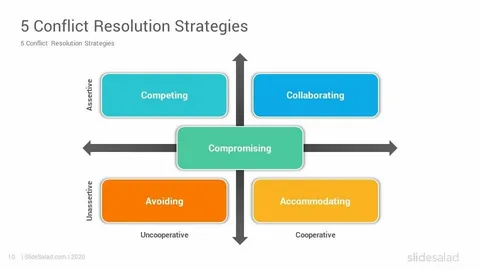Introduction
Workplace conflicts are inevitable, but how you handle them can make all the difference. This guide builds on our article about effective communication and provides practical strategies for resolving conflicts constructively while maintaining professional relationships.
Understanding Conflict Types
Recognize different types of workplace conflicts. This understanding is crucial for navigating workplace challenges. Learn to identify task conflicts, relationship conflicts, and process conflicts, and develop appropriate strategies for each.
Conflict Resolution Strategies
Develop effective conflict resolution skills. This ability supports your professional relationships. Practice active listening, maintain emotional control, and focus on finding mutually beneficial solutions.
Mediation and Facilitation
Learn to mediate conflicts between others. This skill aligns with leadership development. Develop techniques for facilitating discussions, maintaining neutrality, and helping parties reach agreement.
Preventing Conflicts
Implement strategies to prevent unnecessary conflicts. This proactive approach is essential for long-term career growth. Focus on clear communication, setting expectations, and addressing issues early.
Handling Difficult Conversations
Master the art of difficult conversations. This skill is crucial for career advancement. Learn to prepare for challenging discussions, maintain professionalism, and achieve positive outcomes.
Conclusion
Effective conflict management is a critical skill for workplace success. By understanding different types of conflicts, developing resolution strategies, learning mediation techniques, preventing unnecessary conflicts, and mastering difficult conversations, you can create a more positive and productive work environment while strengthening your professional relationships.
Frequently Asked Questions
Q: How should I handle a conflict with my supervisor?
A: Approach the situation professionally and respectfully. Schedule a private meeting to discuss the issue, focusing on facts rather than emotions. Prepare your points in advance and be open to their perspective. Use “I” statements to express your concerns, and be willing to listen and compromise. If the conflict persists, consider involving HR or seeking guidance from a mentor.
Q: What should I do if I’m mediating a conflict between team members?
A: Start by meeting with each person individually to understand their perspective. Create a safe, neutral environment for the discussion. Set ground rules for respectful communication and active listening. Focus on finding common ground and mutually beneficial solutions. Remain neutral and avoid taking sides. Follow up after the resolution to ensure the agreement is working.
Q: How can I prevent conflicts from escalating?
A: Address issues early before they become major problems. Practice clear and open communication. Set clear expectations and boundaries. Be proactive in identifying potential sources of conflict. Build strong relationships based on trust and respect. When conflicts do arise, address them directly and professionally rather than avoiding them.

